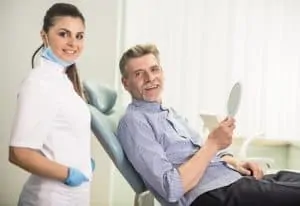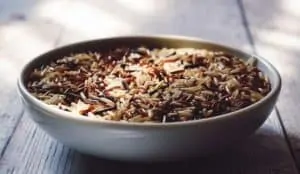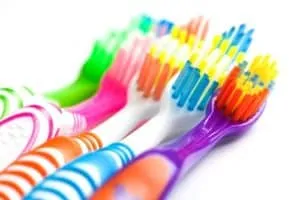Oral Health

Chewing Ice
We understand that sometimes you just want to chew on the refreshingly cold ice in your drink. But you really shouldn’t. Chewing on really hard ice cubes can cause tiny chips in your teeth and can even break a large piece of a tooth right off. Gnawing on big pieces of ice can even damage existing dental work such as fillings or crowns which would then need to be repaired.
Biting Your Nails
Biting your nails is a habit that’s dangerous for your smile and your overall health. Your nails are a perfect place for tons of bacteria to hide and a great spot for you to pick up more bacteria from all the things you touch throughout the day. Now, think about what may be getting into your mouth as you bite or chew on your fingernails? Pretty gross, huh? But that’s not all. Biting your nails can cause chips and cracks in your teeth and may even contribute to jaw pain or damage.
Brushing Too Hard
Believe it or not, there is such as thing as brushing your teeth too hard. A rough tooth scrubbing can scratch the protective layer of tooth enamel and actually leave teeth at increased risk for decay. Using a medium or hard bristled toothbrush may also cause similar damage to teeth. Your gums can also be negatively affected by brushing too hard. They can recede, exposing more of the tooth roots and increasing sensitivity.
Eating Acidic Foods
Acidic foods like citrus fruits such as lemons, oranges, and grapefruit can erode tooth enamel and leave teeth exposed to bacteria, increasing the likelihood of decay as well as sensitivity. When you do just have to have that orange or drink that glass of wine, try to pair it with drinking a glass of water to neutralize the acids.
Smoking
Smoking, or really using any type of tobacco, can greatly increase the chance of developing scary oral health problems such as gum disease and oral cancer. Both of these serious health problems can lead to other issues all their own. Smoking can also affect the appearance of teeth by causing them to yellow or take on a slightly brownish tint.
Your dentist in Sparks is dedicated to helping you get and keep a smile you’re proud of. Besides maintaining regular dental appointments and brushing and flossing regularly, pay attention to how some of your daily habits can affect your smile. Try to reduce the risk of damage by knowing your habits and working to stop them.

How Smoking Affects Your Oral Health
One of the commonly overlooked dangers of smoking is how it affects oral health. But it’s certainly a concern for your dentist in Sparks. The truth is, several oral health problems are directly related to smoking, and continuing to smoke can put you at increased risk for:
- Dry mouth
- Bad breath
Tips to Quit
Smoking is addictive and therefore not easy to quit. Some people even try quitting multiple times before they succeed at never picking up another cigarette. We understand how difficult quitting can be and are here to provide support for anyone looking to improve their health by never lighting up again.
- Find a Support Team. Trying to do something as difficult as quitting smoking isn’t easy to do on your own. Sometimes it’s made easier by finding trusted friends, family members, or health professionals to help. Make sure your chosen quit team can be supportive in the way you need them to be and set up a plan with them.
- Identify Your Reasons to Quit. Writing out a physical list of why you want to quit smoking can be a great first step to success. Seeing your reasons on paper may help them feel more ‘real.’ When you have a strong craving, get out your list and remind yourself all of the reasons why quitting is important.
- Know Your Triggers. Part of what can make quitting so difficult is that smokers often develop a routine to when they smoke — on the car ride to work, when drinking alcohol, drinking coffee in the morning, to name a few. While some triggers may be harder to avoid than others, try your best to steer clear of anything that will make you want to light up.
- Find Alternatives. Another thing that makes it difficult to quit smoking is that smokers get so used to having something in their hand that when they suddenly don’t, it feels uncomfortable. Keep your hands busy by holding a pencil or straw. This can mimic the feeling of a cigarette and ease the mind.
This year’s Great American Smokeout can be your time to finally quit smoking. On November 15, make a plan to quit and stick to it. Select a quit date and take the steps to become smoke free by that date. Your physician, along with our Sparks dental office, can also provide you with additional ways to help.

Orthodontics
From crooked teeth to gaps, orthodontics can help solve a variety of smile concerns. There are several types of orthodontics now available to patients looking for a smile-straightening solution. Treatment options can range from traditional orthodontics of wire and brackets to newer clear aligners, or even a hybrid of the two with tooth-colored wires and brackets. Your dentist in Sparks can help you find the best option for you.
Porcelain Veneers
One of the most popular forms of cosmetic dentistry is porcelain veneers. Porcelain veneers are super thin pieces of porcelain that are permanently fixed the surface of teeth and can create a whole new look. The veneers are custom-created to compliment the natural shape and color of individual teeth so they blend seamlessly into your smile. They have been used to cover up tooth staining and discoloration that couldn’t be addressed using professional smile whitening. Dental veneers can also treat gaps, crooked teeth, or broken teeth.
Cosmetic Bonding
If a tooth is broken or chipped it’s usually repaired using cosmetic dental bonding. Like veneers, bonding is done with an artistic eye, matching the color of the rest of the tooth for an unnoticeable restoration. Bonding is used to treat small areas that simply need to be reconstructed instead of large areas. While this treatment is most commonly used as a solution to a break or chip, it can also be used to help rebuild a tooth that has been worn down from clenching or grinding.
Smile Makeover
When your dentist recommends combining a few different cosmetic dentistry treatments to create the look you want, it’s often referred to as a smile makeover. Your dental team will plan the order of treatments and map out the entire process for you before getting started. Some may even be able to show you what your new smile will look like prior to beginning treatment.
Just because we’re in the heart of jack-o-lantern season doesn’t mean you need to continue to hide a smile that spooks you. Give our Sparks dental office a call today to talk about how cosmetic dentistry can transform your smile.

What Are the Responsibilities of a Dental Hygienist?
Many people know that dental hygienists are responsible for giving each and every patient a thorough, in-depth cleaning at their appointments. But the responsibilities of hygienists go far beyond dental cleanings. These team members also help educate patients on any oral health concerns and proper at-home care, identify any problems early, and are focused on preventing these problems in the first place in order to keep patients healthy. After all, according to the American Academy for Oral Systemic Health (AAOSH), there is a link between oral health and several problems that can affect the entire body such as heart disease, diabetes, and stroke.
What’s Required to Become a Dental Hygienist?
The first step to becoming a dental hygienist is to get an associates degree. As of 2017, there were more than 300 accredited dental hygiene programs available in the United States. These programs can be found at local community colleges, technical schools, and universities. To earn a degree in dental hygiene it takes about three years of schooling, including labs, clinical work, and classroom lectures. An interest in the sciences including biology, chemistry, and anatomy would make the coursework and a dental hygiene career more enjoyable. Once a degree is earned, dental hygienists are usually required to pass a licensing test.
Top Tips for Patients
When you visit your dentist in Sparks, you will most likely have some time with a dental hygienist. Besides preventing any dental problems from popping up, this hygienist is also responsible for passing along information on how you can keep your teeth healthy in between visits. Some of the most helpful tips are below.
- Brush for Two Minutes
Brushing every day is great, but brushing twice a day using correct technique and for the recommended two minutes is even better. Use a soft-bristled toothbrush and small, gentle circles instead of scrubbing back and forth.
- Floss Regularly
When you don’t floss regularly, you’re leaving about 35% of each tooth uncleaned. That greatly increases the likelihood that bacteria will wear away enamel and cause decay. Flossing in between every tooth and up under the gum line can minimize this risk.
- Use Mouthwash, But Choose Wisely
Many times mouthwash is used as a breath freshener, but if you’re using the wrong mouthwash for you it can actually make bad breath worse. If you choose to use mouthwash, choose one with the ADA Seal of Acceptance or talk with your hygienist about what’s right for you.
This October, and at every visit, we hope that you will thank your dental hygienist for doing their part in keeping your smile healthy. If it’s been longer than six months since your last dental cleaning, we welcome you to call our Sparks dental office to schedule an appointment today.

Watch What You Eat
Of course if you eat a pasta dish packed with garlic or a hot dog loaded up with diced onions your breath is going to tell everyone you talk to what you had for lunch. But your diet can affect your breath long-term, too. Eating enough fresh and crunchy fruits and veggies such as apples, carrots, or celery regularly will help rub off any bad breath bacteria that may be sticking around on teeth.
Brush, Brush, Brush
Brushing your teeth for two minutes twice a day not only protects your pearly whites from decay and cavities, it also helps remove any bacteria that’s built up throughout the day (or night!). Besides brushing, flossing helps get rid of the more stubborn bacteria that have wiggled their way up under gums. Don’t forget about your tongue either. A gentle brush or a swipe of a tongue scraper will take care of any bacteria that’s left over.
Fight Off Dry Mouth
There are many things that can cause dry mouth including smoking, mouth breathing, and even certain medications. While dry mouth is uncomfortable, it may also a contribute to bad breath. When a mouth is dried out there’s not enough saliva to clean away bad breath bacteria, which builds up and gives off an unpleasant smell. To protect yourself from dry mouth and bad breath drink a lot of water, talk to your doctor about possibly using a different medication, and make a plan to quit smoking.
Stop Smoking
Speaking of quitting smoking, smokers tend to suffer from something known as smokers’ breath. This unique smell is caused by the tobacco itself and also from the chemicals found in cigarettes. These chemicals bring a stench all their own which lingers around even after someone is done smoking. Quitting can help your health in more than ways than helping freshen your breath. It can reduce your risk for heart disease and several types of cancer.
It Could Be More Than Just Bad Breath
Bad breath doesn’t only affect oral health. The truth is it can also be a sign of a problem somewhere else in the body. Not all bad breath smells the same, and different smells can indicate various health concerns. For example, a slight stench of ammonia may be a symptom of liver cirrhosis. Bad breath has been tied to many systemic diseases including kidney disease, cystic fibrosis, and respiratory infections.
Bad breath should be taken seriously. If it’s a chronic problem, you should see your dentist in Sparks as soon as possible.
Nobody should have to live with the embarrassment of bad breath or the fear that it’s a sign of something serious. Our dental office in Sparks can help. We encourage you to give us a call to schedule an appointment with our trusted team today. We’ll talk with you about your health history, habits, and discuss the best solutions to get rid of your bad breath.

Whole Grains Protect Teeth, Too
Whole grains can be great for our hearts and may even help reduce the risk of obesity and cancer. But recent research shows that eating the recommended daily dose of whole grains can protect oral health, too. Foods rich with whole grains are loaded with vitamins, minerals, and antioxidants that work to keep mouths healthy.
- Magnesium – Magnesium works with calcium to build strong teeth and strengthen enamel to protect them against bacteria and decay.
- Vitamin E – One of the main functions of vitamin E is to reduce inflammation. This is important in the fight against gum disease. Research shows a positive correlation between high inflammation levels and the risk for developing gum disease, a vitamin E can help keep inflammation levels low.
- B Vitamins – A variety of B vitamins found in whole grains are beneficial to oral health by lowering the risk of developing mouth sores or canker sores and fighting off bad breath. Some studies also show a positive correlation that certain B vitamins can protect against cavities.
Recommended Daily Whole Grain Servings
The table below shows the recommended daily servings by age range and gender according to the 2015-2020 Dietary Guidelines for Americans.
| Age | Female | Male |
| 1-3 | 2 | 2 |
| 4-8 | 2.5 | 2.5 |
| 9-13 | 3 | 3.5 |
| 14-18 | 3.5 | 4 |
| 19-30 | 3.5 | 4.5 |
| 31+ | 3 | 4 |
Best Sources of Whole Grain
Eating enough whole grains doesn’t need to be difficult, and you don’t need to give up delicious foods like some people think. In fact, making small changes can go a long way in helping you and your family get your daily dose of whole grains.
- Swap your morning cereal for a whole grain option
- Use whole grain bread or wraps for sandwiches
- Try a dinner loaded with whole grains by buying whole grain pasta
- Instead of a side of potatoes, eat brown rice
- Choose whole wheat hamburger or hot dog buns instead of white bread
When shopping for foods high in whole grains look for the gold and black Whole Grain Stamp.
Eat Well, See Your Dentist
What we choose to eat has an effect on not only our overall health, but our oral health too. Your dentist in Sparks urges you to follow a well-balanced diet rich in whole grains, fresh fruits and vegetables, and plenty of water.
Eating well and seeing your dentist twice year can keep your smile healthy. Don’t put off your bi-annual dental checkup, call our Sparks dental office to schedule an appointment.

What is Hypersalivation?
Hypersalivation is the medical term used to describe the overproduction of saliva. Basically it means a person has too much saliva in their mouth which can cause them to drool and be uncomfortable or embarrassed. What’s more is that hypersalivation may also be a sign of an underlying problem.
What Causes Hypersalivation?
There are several things that may cause someone to produce too much saliva. Some of the most common explanations are temporary, easily treatable, and no cause for serious concern. However, other times hypersalivation may be sign of something bigger. A few reasons why someone may hypersalivate include:
- Infections including gum disease
- Ulcer
- Acid reflux
- Side effect of medication
- Neurological disorders such as Parkinson’s Disease
- Toxic poisoning
How Much Saliva is Too Much?
Typically people produce around 1.5 quarts of saliva every day. This saliva helps break down food to make it more easily digestible and protects teeth against acids and bacteria that can lead to cavities. However, if someone produces even more than that it can lead to hypersalivation.
Signs & Symptoms
- Intense desire to spit a lot
- Drool spots on a pillow
- Feeling the constant need to swallow
- Saliva easily falls out during regular activities
- Difficulty eating or drinking
Excessive saliva production isn’t something that you should ignore. We recommend talking with your dentist in Sparks about your symptoms, how long you’ve been experiencing them, and your thorough medical history.
We’re always welcoming new patients at our Sparks dental office and will be happy to help. Schedule an appointment with our compassionate team and we’ll work with you to determine what’s causing hypersalivation and the best way to treat it. Give us a call today.

What Do the Studies Say?
This is a great question with a not-so-easy answer. Essentially, it depends on who you ask. The American Dental Association (ADA), for example, states that both manual and electric toothbrushes do what they’re supposed to do — clean teeth by removing plaque and bacteria. Researchers don’t provide a solid conclusion on whether one tool necessarily cleans better than the other. What they do say, however, is that getting a thorough clean isn’t so much about the type of toothbrush used but rather the brushing technique.
On the other hand, companies that make electric toothbrushes publish research occasionally that backs up their claim that electric toothbrushes are better at cleaning teeth than manual toothbrushes. One such study published in the Journal of the American Dental Association reported that nearly 13,000 out of 16,000 participants said they had better oral health after using an electric toothbrush for the duration of the study.
When it really comes down to it, you should pick a toothbrush that you’ll use regularly and fits your unique needs. A good place to start your search is by asking your dentist in Sparks and by analyzing the pros and cons to both manual toothbrushes and electric ones.
Weighing the Pros & Cons
Knowing the pros and cons to both types of toothbrushes can help you narrow your search.
Manual Pros
- Cheaper
- Portable
- No need for chargers
Manual Cons
- No timer makes it too easy to brush too quickly
- May be difficult for some to use a proper technique resulting in a less effective clean
- Allow for easier tough scrubbing which can damage enamel and gums
Electric Pros
- Easy to use
- Some come with built-in timers
- Promote gentle, proper brushings
Electric Cons
- More expensive up front
- Replacing the heads is expensive, too
- Inconvenient for those who travel
If you’re still not sure what the best choice is for you, give our Sparks dental office a call to schedule an appointment today. We’re always welcoming new patients and will be happy to help.

What is Sedation Dentistry
Sedation dentistry, also known as sleep dentistry, is a treatment used by many dentists to help ease stress and relax the mind and body. It’s most appropriate for those with dental anxiety or even during longer appointments that may cause patients to become uncomfortable. While the term ‘sleep dentistry’ may lead people to believe that they will be put to sleep during treatment, oftentimes this isn’t the case.
3 Types of Sedation Dentistry
When your dentist in Sparks talks about sedation dentistry, they aren’t necessarily referring to one specific treatment. There are, in fact a variety of different sedation dentistry options available to patients depending on their needs. Let’s take a closer look at some of the most common types of sedation dentistry.
- IV Sedation (Intravenous Sedation)
The deepest level of sedation is known as IV sedation. During IV sedation, medication is administered into the body through a needle that’s been inserted into a vein. Since the medicine has a direct route to the bloodstream it takes effect pretty quickly and can last the entire appointment. Sometimes dental offices may bring in an anesthesiologist to perform the treatment. Some potential side effects of IV sedation may include dizziness, tiredness, or nausea. These effect can linger for up to 24 hours after treatment.
- Oral Sedation
If IV sedation isn’t an option or is perhaps too strong for some cases, a dentist may choose an alternative called oral sedation. Oral sedation involves simply taking a small prescription pill a little bit before the appointment. This more mild sedation option will still help patients feel relaxed, but doesn’t typically have the same lingering side effects as IV sedation. Patients will usually stay awake yet remain calm. There’s still a chance of feeling a bit tired as the medication wears off after the appointment. Patients should have a driver available to take them both to and from the appointment.
- Nitrous Oxide
Laughing gas, or nitrous oxide, is also a sedation option available at many dental offices and is the lightest form of sedation dentistry. This option allows patients to breathe in a concentrated mixture that will ease nerves and create a relaxed state. The effect vanishes easily and quickly once the nitrous oxide is removed and rarely has many side effects. Sometimes patients will receive oxygen to help reverse the medication.
While we certainly understand that the anxiety often associated with a dental visit is very real, nobody should avoid getting the dental care they need to keep their mouths and bodies healthy because of a fear of the dentist. The best thing you can do is talk with the team at our Sparks dental office about any fears you have. We’ll go out of our way to recommend the best option for you to help keep you relaxed at every appointment.

Preventive Care Protects
Even if you brush twice a day everyday at home, there are just some things you can’t get rid of on your own. Cleanings and checkups with your dentist in Sparks help to not only safely and effectively remove damaging plaque and tartar buildup, they also help keep a close eye on your overall oral health. Without these appointments every six months, the mouth is at risk. Men in particular have a better chance of:
Advanced Dental Treatments. Since many men don’t visit the dentist regularly, they tend to be more likely to need advanced treatments. When plaque and tartar is left on teeth for prolonged periods of time they can lead to decay. Oftentimes decay is easily treated with a quick filling. However, if it progresses deep into the tooth,a a root canal and dental crown may be required to save the tooth. However, decay that’s compromised the integrity of a tooth could mean the need for an extraction and a dental implant or bridge to replace it.
Gum Disease. Both the American Dental Association (ADA) and Academy of General Dentistry (AGD) have conducted numerous studies that consistently show that men are more likely to develop gum disease than women. One recent study of Americans between the ages of 30-54 reported that 34% of men have gum disease compared to 23% of women. Gum disease isn’t a condition to take lightly. If untreated it can affect the entire body and as even been linked to heart disease, respiratory problems, and certain cancers. In men, gum disease may also affect prostate health. But it’s not all bad news. If caught early at regular dental visits gum disease can be treated before it has a chance to affect overall health.
Oral Cancer. Oral cancer is a widespread epidemic that will affect almost 50,000 newly diagnosed Americans this year. Men are actually twice as likely to develop oral cancer than women. If it’s caught early treatment is often very successful. But if it’s left to progress, it can spread to other areas of the body and can lead to death.
Visits to the dentist every six months go a long way in protecting your oral health and overall health. Don’t risk your health by skipping them. If it’s been longer than six month since your last appointment, we welcome you to call our Sparks dental office today.
